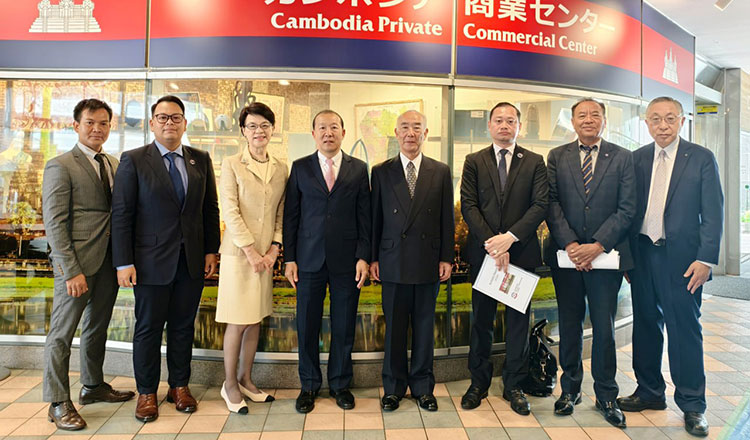
The Cambodian Private Commercial Center in Atsugi City, Japan, has emerged as a key platform for promoting Cambodia’s trade, investment, tourism, and culture to Japanese businesses and the public, said Seang Thay, Secretary of State at the Ministry of Commerce (MoC), during an official visit on Friday.
Leading a delegation from MoC to Atsugi, Kanagawa Prefecture, Japan, Secretary Thay visited the centre to assess its operations and discuss plans to extend its activities for another three years.
The inspection was aimed at ensuring the centre remains a vibrant and effective hub for economic diplomacy and outreach in one of Japan’s most dynamic regions.
During the visit, Thay held discussions with Takashi Okami, Director of Kojima Holdings Co., Ltd., Machiko Kosugi, Head of the Cambodian Private Commercial Center, and Kusunoki Rissei, Chairman of the Cambodia Community in Japan. He praised the center’s appealing presentation and its strategic role in showcasing Cambodian products while providing vital information to Japanese investors and potential business partners.
“The Cambodian Private Commercial Center in Atsugi is not only well-designed but also plays an essential role in deepening economic and cultural ties between our two countries,” said Thay.
He also commended the centre’s efforts in boosting bilateral trade and investment and urged its continued collaboration with the Ministry of Commerce. In particular, he proposed co-organizing Cambodia-Japan Business and Investment Forums, facilitating business matching opportunities, and assisting Japanese investors interested in Cambodia’s growing market.
The Cambodian Private Commercial Center in Atsugi has become a cornerstone in Cambodia’s strategy to expand its economic footprint in Japan, fostering stronger people-to-people connections and encouraging new waves of investment into the Kingdom.
Japan is currently Cambodia’s fifth-largest trading partner, with bilateral trade (exports and imports combined) totalling $656 million from January to March 2025, representing a 29.5 percent year-on-year growth.
Cambodia’s exports to Japan amounted to $430.61 million in the first quarter of 2025, reflecting a 17.9 percent increase compared to the same period the previous year. Meanwhile, imports from Japan reached $225.83 million, marking a significant 59.2 percent rise.
Cambodia’s primary exports to Japan include garments, bags, footwear, furniture, cosmetics, paper and office supplies, and leather goods.
On the other hand, Cambodia imports machinery, automobiles, electronics, furniture, fabrics, and plastics from Japan.
Regarding Japanese investment in various countries, Seun Sam, a policy analyst at the Royal Academy of Cambodia, told Khmer Times that foreign investors, especially Japanese firms, thoroughly research before committing to investments in any nation.
“They assess a wide range of factors, such as political stability, production capacity, and infrastructure quality, including essential services like water supply, electricity, and transportation systems. Above all, they focus on issues like corruption, hidden costs, and regulatory transparency when making investment decisions,” Sam explained.
He further pointed out that for Cambodia to attract Japanese and other foreign investors, it must address its internal challenges and improve its institutional capacity. “Investors are not opposed to Cambodia as a potential destination, but they always hire professional teams to conduct detailed market assessments before making any investment. These studies focus on investment opportunities, risks, and expected profitability.”
According to Sam, foreign investors are highly focused on financial returns and managing risks. “If their market research reveals that a specific project is unlikely to be profitable, they will simply not invest. All investment groups prioritize financial sustainability and will avoid markets with significant uncertainties or inefficiencies,” he said.
He emphasized that for the Cambodian government to seriously attract foreign investment, it must take tangible actions to address existing issues. “Improving governance, reducing bureaucratic obstacles, and combating corruption are essential to building investor confidence. Strengthening infrastructure and boosting the tourism sector will also help make Cambodia a more appealing investment destination,” he said.
According to a recent report, Japan has invested in 149 projects in Cambodia, with a total investment capital of around $2.9 billion.
Among the notable Japanese-backed projects in the Kingdom are shopping malls, automobile assembly plants, small-scale motor manufacturing facilities, etc.
Source: Khmer Times
Share: